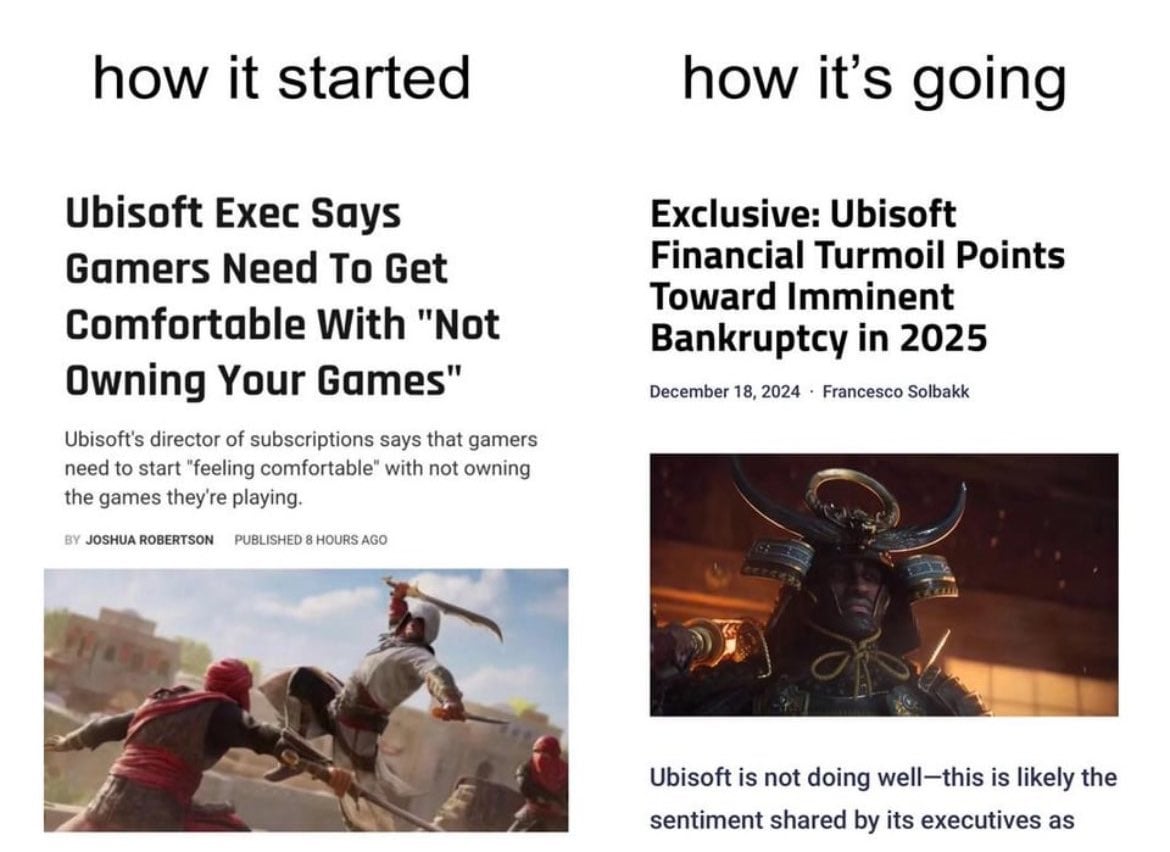this post was submitted on 09 Jan 2025
1200 points (98.7% liked)
Gaming
5679 readers
180 users here now
!gaming is a community for gaming noobs through gaming aficionados. Unlike !games, we don’t take ourselves quite as serious. Shitposts and memes are welcome.
Our Rules:
1. Keep it civil.
Attack the argument, not the person. No racism/sexism/bigotry. Good faith argumentation only.
2. No sexism, racism, homophobia, transphobia or any other flavor of bigotry.
I should not need to explain this one.
3. No bots, spam or self-promotion.
Only approved bots, which follow the guidelines for bots set by the instance, are allowed.
4. Try not to repost anything posted within the past month.
Beyond that, go for it. Not everyone is on every site all the time.
Logo uses joystick by liftarn
founded 2 years ago
MODERATORS
you are viewing a single comment's thread
view the rest of the comments
view the rest of the comments

G*mers have already grown used to not owning their games. It's called Steam.
That's not what they meant. The person who said it was "director of subscriptions." They meant gamers need to get used to all games being SaaS because they are of the opinion that that's what's going to happen. SaaS is capable of generating magnitudes more money than any other paradigm, so this is of course the wet dream of the bean counters.
The problem with the statement, of course, is threefold:
Shit, the world can't even support half a dozen streaming video subscription services, but they think everybody's going to gladly pay monthly fees for every game they play?
You've never owned your games. It's always been a license to play the games. It's just that now they have the ability to enforce it.
It was not like this back in the '90s. Games you purchased were on disk/disks. You installed the game and played the fully completed game that did not require an online connection. You owned that game.
After the Digital Millennium Copyright Act of 1998 things changed. So it has not always been like this.
You were still buying a license to play the games.
But without a way to enforce it, it was (and still is) functionally identical to owning them outright. What it's legally called is irrelevant.
Oh that's easy. For me at least. In my analysis, the law is wrong.
Where are the assets stored. On local storage? Then I own a copy of the assets.
Where is the game logic executed? Locally? Then I own a copy of that game logic. A server? Then I own non of that logic. A hybrid of the two? Then I own a copy of what my hardware processes.
Where is the game save data stored? Locally? Again, that a copy I own. On a server? I'm licensing it.
Here's a good analogy: Monster Hunter: Processing, assets, and saves are all on individual machines. I can be cut off from the internet, and still play. I own a copy.
Diablo IV: the assets are local, processing my inputs is local, but my saves and the game logic are all processed on a server. I own a copy of the assets and input logic. Blizzard owns the rest as they process the rest.
If they want to do the whole "resources=expense" then I get to consider MY resources as expense too.
Before the internet, the concept of game ownership was much easier. Whatever the seller chose to call it, as long as I had complete control over when and where I could play the game, I owned it. I would consider any game where the ability to play it cannot be willfully taken from me by digital means to be owned by me. Nowadays, that mostly applies to cracked games or systems only. No game that requires an online connection to play would apply.
But you could trade them with your friends, so single license meant nothing. You owned the game.
I don't think most people's sense of "ownership" of a copy of a game has anything to do with whether or not they've legally bought a license.
For most of my collection, I own a physical thing, that represents the ability to play that game, using hardware I bought, whether I bought those things today, last year, or even a decade ago. Some of my games are digital, but I still have possession of a copy I bought, and can play it whenever I want. I paid money for the right to play a game when I want, and that's a notion of ownership.
If someone can take it away from me, that isn't aligned with my notion of ownership, and also isn't worth spending money on imo. I own some GameCube games, and yes, technically that means I have a license, but they still work physically and legally. There's nothing to enforce against me.
The thing that changed is the ability to revoke that license. And that amounts to a different concept than ownership. One not worth paying for.